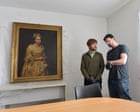
In a week punctuated by diverse global stories, we witness a blend of art recovery efforts, military maneuvers, political shifts, and poignant personal tragedies. Through these narratives, we gain glimpses into the complexity and interconnectedness of the world around us.
In a significant cultural recovery, an 18th-century portrait, stolen during the turbulent World War II era by the Nazis, has been discovered in Argentina. This revelation came to light after Dutch journalists identified the painting online, listed among the possessions of the late daughter of a former Nazi official. The portrait’s emergence from obscurity in the peaceful town of Mar del Plata marks a triumphant step in the ongoing efforts to restore art plundered during the war to its rightful owners. It also highlights the persistence of history, where past actions continue to resonate and shape our present experiences.
Meanwhile, in the geopolitical arena, the United States has escalated its military presence in the Caribbean with the deployment of 10 F-35 fighter jets to Puerto Rico amidst a campaign against drug cartels. This decision follows heightened tensions after a confrontation with Venezuelan forces and a consequential missile strike. The U.S. Secretary of State, Marco Rubio, affirmed a strong stance against drug trafficking, emphasizing this as a necessary measure in safeguarding regional stability. The strategic move serves as a reminder of the delicate balance between maintaining security and diplomatic relationships in this vibrant region.
Across the Pacific Ocean, Samoa has recently witnessed a shift in its political landscape. Fiame Naomi Mata’afa, the nation’s first female prime minister, known for her tenacity and leadership, has stepped down after struggling to secure a majority in the latest elections. Her tenure was marked by political infighting, but her leadership has paved the way for future female leaders in the Pacific. The opposition Fast party has gained a majority and is set to influence the country’s future direction, reflecting the democratic dynamism inherent in Samoa’s governance.
However, not all news this week brings comfort. Readers are drawn to a personal tragedy involving the heartbreaking loss of a British couple, Kayleigh Smith and William Nelson, in a funicular streetcar accident in Lisbon. The incident, which resulted in multiple fatalities, has left families grieving and serves as a somber reminder of life’s unpredictability. As the community processes this tragedy, there is space for reflection on ensuring safety and preventing future mishaps in public transportation systems.
In another sorrowful turn of events, a body found on a Greek island has been confirmed as Michele Bourda, a British tourist who went missing over a month ago. Her disappearance sparked a large-scale search, and her family’s sorrow is compounded by claims of a delayed response from local authorities. This tragic incident underscores the need for timely action in crisis situations to prevent similar outcomes in the future.
In the realm of European politics, the Spanish political party Vox is fiercely staging anti-immigration campaigns, aiming to test and potentially elevate a spokesperson as a prospective candidate in future elections. The strategy reflects ongoing debates around immigration in Europe, with various political factions positioning themselves on this sensitive issue. The unfolding political narratives in Spain could significantly influence the broader discourse on immigration across the continent.
These stories, varied and impactful, collectively paint a picture of a week brimming with cultural triumphs, strategic movements, political transitions, and poignant personal stories. Each narrative, whether uplifting or tragic, contributes to a larger tapestry that exemplifies the diverse and dynamic nature of our world today.
Source: {link}
